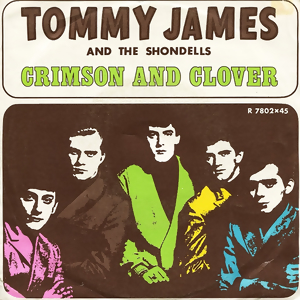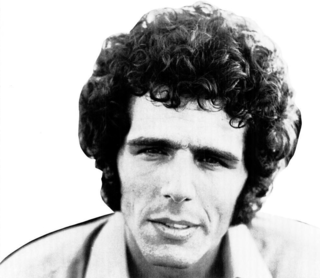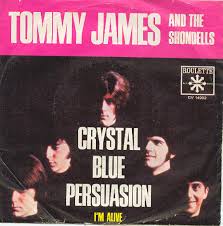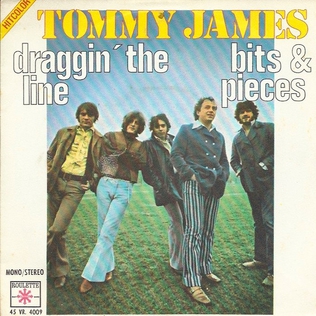
Tommy James and the Shondells is an American rock band formed in Niles, Michigan, in 1964. They had two No. 1 singles in the U.S. – "Hanky Panky" and "Crimson and Clover" – and also charted twelve other top 40 hits, including five in the Hot 100's top ten: "I Think We're Alone Now", "Mirage", "Mony Mony", "Sweet Cherry Wine" and "Crystal Blue Persuasion".

Tommy James is an American musician, singer, songwriter, and record producer, widely known as frontman of the 1960s rock band Tommy James and the Shondells, who were known for their hits including "Mony Mony" and "Crimson and Clover", and "I Think We're Alone Now".

"Crimson and Clover" is a 1968 song by American rock band Tommy James and the Shondells. Written by the duo of Tommy James and drummer Peter Lucia Jr., it was intended as a change in direction of the group's sound and composition.

Crimson & Clover is the sixth album by Tommy James and the Shondells. It features the #1 hit "Crimson and Clover" as well as the #2 hit "Crystal Blue Persuasion". The album "Crimson & Clover", was released in December 1968 and reached a peak of #8 on the Billboard 200.

Robert Bloom was an American singer-songwriter. He is known best for the upbeat 1970 hit, "Montego Bay", which was co-written with and produced by Jeff Barry.

"Livin' on a Prayer" is a song by the American rock band Bon Jovi, and is the band's second chart-topping single from their third album Slippery When Wet. Written by Jon Bon Jovi, Richie Sambora and Desmond Child, the single, released in late 1986, was well received at both rock and pop radio and its music video was given heavy rotation at MTV, giving the band their first No. 1 on the Billboard Mainstream Rock chart and their second consecutive No. 1 Billboard Hot 100 hit.

"Misty Blue" is a song written by Bob Montgomery that has been recorded and made commercially successful by several music artists. Although Montgomery wrote the song for a different artist in mind, it was brought first to the attention of Wilma Burgess in 1966. It was recorded by Eddy Arnold the following year, both versions were top 5 Country Hits. A decade later, blues artist Dorothy Moore released the highest-charting version of the song and it reached the top ten in several different radio formats. Following Moore's revival of the track, numerous artists re-covered the tune, including country artist Billie Jo Spears. Spears's version would also go on to become a successful single release. Numerous other artists and musicians of different genres have recorded their own versions of "Misty Blue". The song is now considered both a country music and blues standard.

Gary Wayne Schelton, better known as Troy Shondell, was an American singer, who achieved fame in the early 1960s. He became a transatlantic one-hit wonder, by releasing a single that made the record charts in both the US and the UK. The song, "This Time" sold over one million records, earning gold disc status. In a single year, sales were over three million copies.

"Hanky Panky" is a song written by Jeff Barry and Ellie Greenwich for their group, the Raindrops.

"I Think We're Alone Now" is a song written and composed by Ritchie Cordell that was first recorded by Tommy James and the Shondells. It was a major hit for the group, reaching number 4 on the US Hot 100 in April 1967. It finished at No. 12 on Billboard magazine's year-end singles chart for 1967.

"Mony Mony" is a 1968 single by American pop rock band Tommy James and the Shondells, which reached No. 1 on the UK Singles Chart and No. 3 in the U.S. Written by Bobby Bloom, Ritchie Cordell, Bo Gentry, and Tommy James, the song has appeared in various film and television works such as the Oliver Stone drama Heaven & Earth. It was also covered by English singer-songwriter Billy Idol in 1981. Idol's version, which took in more of a rock sound, became an international top 40 hit and additionally revived public interest in the original garage rock single. In 1986 it was covered by Amazulu, who gave it a ska rendition. Idol recorded a live version in 1985 and was ultimately released in 1987 where it became an even bigger hit than the Shondells 1968 original reaching No. 1 on the Billboard Hot 100.

"Crystal Blue Persuasion" is a 1968 song originally recorded by Tommy James and the Shondells and composed by Eddie Gray, Tommy James and Mike Vale.

"Draggin' the Line" is a hit song by American rock musician Tommy James, who went solo after the Shondells disbanded in 1970. It was first released as the B side of "Church Street Soul Revival" in 1970. The song was judged to have some hit potential so they went back in the studio and added horns to the master and re-released it as an A side single in 1971. It was included on his second album, Christian of the World in 1971 on the Roulette Records label. The song was James' biggest hit as a solo artist selling more than a million copies, and appears as the fifth track on James' 1991 retrospective album The Solo Years (1970-81) released by Rhino.

"Sweet Cherry Wine" is a song by Tommy James and the Shondells from their 1969 album, Cellophane Symphony. It hit number seven on the Billboard Hot 100 and rose to number six on the Canadian charts. This psychedelic song was released at the height of psychedelia, right after one previous 'mind expanding' song by Tommy James and the Shondells, "Crimson and Clover", and before "Crystal Blue Persuasion". It begins with the use of an organ, adds brass instruments, and ends with a solo flute that fades out at the end. Adding to the feel of this form of music, this and other songs on the album included the then-new Moog synthesizer.
"Gettin' Together" is a song written by Ritchie Cordell and recorded by Tommy James and the Shondells for their 1967 album, Gettin' Together. The song reached number 18 on The Billboard Hot 100 in 1967. The song also reached number 24 in Canada. The song was the group's fourth charting single of the year. "Gettin' Together" is based on the opening bass riff of "Gimme Some Lovin'", a single by the Spencer Davis Group released in 1966. However, the remainder of "Gettin' Together" continues in the pop-rock direction James began in his previous album, I Think We're Alone Now, under the tutelage and production of Ritchie Cordell and Bo Gentry. Jimmy Wisner arranged the music for the song. A cover version of the song was also done by Gene Pitney.
"She" is a song recorded by Tommy James and the Shondells and released as a single in November 1969; it was also included on the band's 1970 album, Travelin'. The song reached No. 23 on the Billboard Hot 100 on January 24, 1970. The song also reached No. 15 in Canada. It was the 13th and final top 40 hit for the band, although James went on to have three more top 40 hits as a solo artist.

I Think We're Alone Now is the third of three studio albums by the pop rock band Tommy James and the Shondells, released in 1967.

Travelin' is the eighth studio album by the pop rock band Tommy James and the Shondells released in 1970.

The Best of Tommy James and The Shondells is the second compilation album by Tommy James and the Shondells and was released in 1969. It reached No. 21 on the Billboard Top LPs chart.

Cellophane Symphony is the seventh studio album by American rock band Tommy James and the Shondells, released in October 1969 through Roulette Records. The album was re-issued on CD in 2014 by Rhino Records.


















